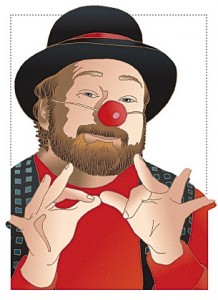Why People Are So Afraid of Clowns
Excellent thought piece on the anthropology of why people hate clowns on the blog of the Scientific American.
I say excellent, although it’s mostly excellent in that she brought it up. From a scholarship perspective she might be getting it right, but from the perspective of the clown, I think she’s got a lot wrong.
She says:
Clowns break all of these social codes concerning humor. With their painted smiles, they encourage the audience to laugh at the “neglected and improper elements†of community life (4). In this light, horror movie fans may find the young Michael Myer’s decision to don his clown mask before killing his sister particularly ominous. Acting is a selective process (5). Actors choose the character elements available to them to effectively convey a sense of the character. If acting involves self-selection and clowns breach the boundaries for what we are told can be humorous, are they intentionally selecting for darkness and subversion?
That clowns insist that we laugh all the time leaves little room for other experiences. While laughter can be warm, it can also be cruel and mocking.
If that were the be all and end all of clowning, it might be true. But many clowns don’t insist we laugh. Many clowns are gentle and good to kids and fun and funny to watch for everybody.
Only the bad clowns (ie, those bad at clowning) insist you laugh no matter what happens, or FOIST their world view on you. The great clowns invite you in to their world view, and those that accept the invitation are often the better for it.
Although I’m wary of generalizations, I do think it’s something anthropological, the fear of clowns. I connect it more to the fear of the unknown. Who is beneath that mask/makeup? What are they thinking? What will they do? For thousands of years, people have been marking their faces and bodies for war, for rituals, to look fearsome, to strike terror into the hearts of their enemies. Yet people rarely say they are afraid of football players. (And they should be!)
Yes, the Joker (from Batman) has a perpetual smile, dresses like a clown, and is a serial murderer. He is also fictional. And sure John Wayne Gacy wore clown makeup and did unspeakable things to kids. So have dozens of priests.
If you are are afraid of clowns (and if you are, you are probably not reading this) it is really your imagination that you are afraid of. Your imagination is letting you down in the worst way. Most clowns won’t harm you. Some clowns will help you change your life for the better (I’m looking at you, Red Bastard!) and yes, a few clowns are malicious and harmful. But that doesn’t mean all of them are!
Here’s my take on the role of the clown (from a Clown Card I wrote over 10 years ago)
The Clown occupies a special place in our psyche as human beings. Confidence man, holy fool, innocent victim, naive greenhorn, spurned lover, sacred trickster- the clown plays all these archetypes and more. The secret of the clown is that his appetites are clear, his obstacles in plain view. We (the audience) recognize ourselves in the work of the clown- our own desires, hopes, frustrations, and follies- all seen through the exaggerated lens of the clown. And by laughing at the predicament of the clown, we allow ourselves to make light of our own shortcomings.



I can’t quite believe the author is really an anthropologist. So much literature exists on the anthropology of clowns. It’s the sort of article I’d expect from a journalist who isn’t a specialist, but an anthropologist…?
People are afraid of all kinds of things. Â Clowns are no exception.
This quote is where I start my thinking on the topic.
“The clown is not particularly interested in making people comfortable.â€Â
Swortzell
Here Come the Clowns